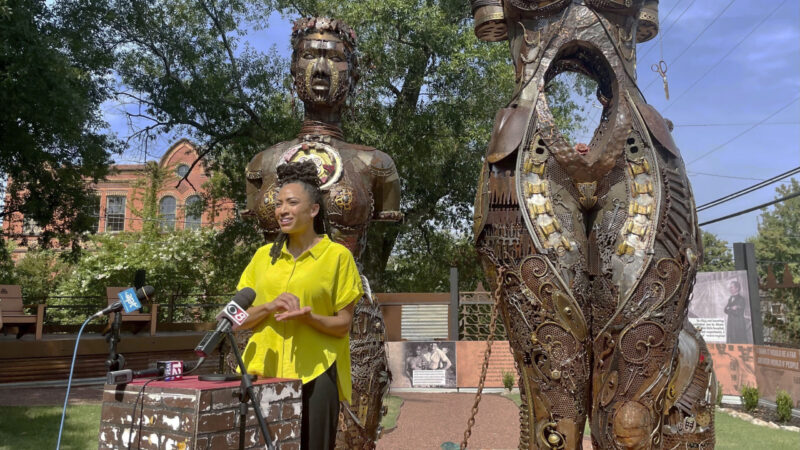Lawsuit challenges Alabama’s ‘de facto ban’ on freestanding birth centers
Stephanie Mitchell, a certified professional midwife, speaks at a press conference in Montgomery, Ala. on Tuesday, Aug. 8, 2023. A group of midwives and doctors filed a lawsuit challenging what they described as Alabama's de facto ban on freestanding birth centers by requiring the facilities be licensed as hospitals. The lawsuit was held in front of an art installation honoring enslaved women who were forced to participate in medical experiments.
MONTGOMERY, Ala. (AP) — A group of midwives and doctors on Tuesday filed a lawsuit challenging what they described as Alabama’s de facto ban on freestanding birth centers by requiring the facilities be licensed as hospitals.
The lawsuit — filed by the operators of one birth center that closed and two others that paused plans to open — asks a judge to block the Alabama Department of Public Health from requiring the facilities be licensed as hospitals. The suit argues the facilities, where low-risk patients can receive prenatal care and give birth, do not constitute hospitals under Alabama law and that the state health department has no authority to regulate them as such.
“The department is imposing this illegal ban on birth centers in the middle of a maternal and infant health crisis in Alabama that is disproportionately harming Black mothers and babies,” Whitney White, a staff attorney with the American Civil Liberties Union Reproductive Freedom Project, said during a Tuesday press conference.
The freestanding birth centers, which provide an option between home and hospital births, would fill a crucial need, the providers argued. Many women in rural areas live far away from a hospital, or they may prefer to give birth outside of the hospital for financial or personal reasons, they said.
The Health Department did not have an immediate comment on the lawsuit.
“The Alabama Department of Public Health has just recently learned of the filing of this lawsuit and has not had opportunity to review it fully. ADPH does not otherwise comment on active litigation,” a department spokeswoman wrote in an emailed response.
While lay midwifes attended births for centuries, Alabama has only made midwifery legal in recent years. Alabama lawmakers voted in 2017 to legalize midwifery, and the state began issuing licenses in 2019.
Stephanie Mitchell, a certified professional midwife who is building a freestanding birth center in Sumter County, said she serves a region where people may drive a roundtrip of 75 or more miles (120 kilometers) to receive prenatal care.
“Having to drive that far can be a serious obstacle and may prevent some people from getting care during their pregnancy at all. People shouldn’t be forced to go without pregnancy care,” said Mitchell, a plaintiff in the case. “Expanding access to midwifery and birth centers in places like Sumter County is a life and death situation for many families.”
Dr. Heather Skanes, who founded the Oasis Family Birthing Center in Birmingham and Dr. Yashica Robinson, founder of the Alabama Birth Center in Huntsville, are also plaintiffs in the case. The Birmingham facility closed and the two others paused plans to start deliveries because of the regulatory issues.
Alabama consistently has one of the highest infant mortality rates in the nation with 7.6 deaths per 1,000 live births in 2022. The mortality rate for Black babies in the state — 12.1 deaths per 1,000 live births — is twice that of white babies, according to statistics from the Alabama Department of Public Health.
Tuesday’s press conference was held beneath a towering art installation known as the “Mothers of Gynecology,” which pays tribute to three enslaved Black women who were subjected to experimental surgery by a 19th century physician celebrated for advancing women’s health. JaTaune Bosby, executive director of the ACLU of Alabama, said that “history still follows us today in policymaking where we see marginalized communities consistently not given adequate health care.”
“This monument reminds us of why we are here advocating for people who have been disregarded, who are solely asking for quality health care and dignity, and for individuals who are committed to giving that to them,” Bosby said.
House Dem. Leader Jeffries responds to air strikes on Iran by U.S. and Israel
NPR's Emily Kwong speaks to House Minority Leader Hakeem Jeffries (D-NY), who is still calling for a vote on a war powers resolution following a wave of U.S.- and Israel-led airstrikes on Iran.
Iran’s Ayatollah Ali Khamenei is killed in Israeli strike, ending 36-year iron rule
Khamenei, the Islamic Republic's second supreme leader, has been killed. He had held power since 1989, guiding Iran through difficult times — and overseeing the violent suppression of dissent.
Found: The 19th century silent film that first captured a robot attack
A newly rediscovered 1897 short by famed French filmmaker Georges Méliès is being hailed as the first-ever depiction of a robot in cinema.
‘One year of failure.’ The Lancet slams RFK Jr.’s first year as health chief
In a scathing review, the top US medical journal's editorial board warned that the "destruction that Kennedy has wrought in 1 in office might take generations to repair."
Here’s how world leaders are reacting to the US-Israel strikes on Iran
Several leaders voiced support for the operation – but most, including those who stopped short of condemning it, called for restraint moving forward.
How could the U.S. strikes in Iran affect the world’s oil supply?
Despite sanctions, Iran is one of the world's major oil producers, with much of its crude exported to China.




